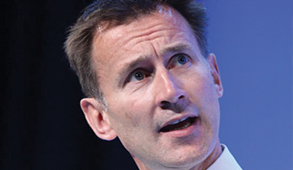MPs call for routine Covid testing for frontline staff
In a report published today, the committee urged the service to begin routinely testing staff as soon as capacity allows and before the winter flu season begins. Without this, the NHS risked having to scale back non-Covid services again. Chief medical officer Chris Whitty had told the committee that he would likely advise routine testing of asymptomatic staff if there is a surge in positive tests. However, the MPs could not see this happening in areas where there has already been a surge, such as the North East and North West of England.
The report, Delivering core NHS and care services during the pandemic and beyond, said the case for testing staff who directly or indirectly provide patient care was compelling. It asked the government to set out clearly why it had not introduced weekly testing of all NHS staff. And it called on Professor Whitty to outline whether he had advised the government to implement routine testing in current virus hotspots and, if not, why.
It asked the government and NHS England and NHS Improvement to set out, by the end of October, current capacity for testing NHS staff, what additional capacity, if any, will be required and how long it would take to introduce routine testing for all staff.
The report also expressed concern for staff health, especially in those with black and minority ethnic backgrounds. It recommended NHS England and NHS Improvement detail the steps they would like to take in the coming years to support their physical and mental wellbeing, together with a plan to deal with sustained workplace pressure. The committee insisted it should receive this before the government spending review announcement, in part so the MPs can judge how far funding pledges will go to enabling implementation of staff wellbeing plans.
Plans for maintaining a consistent and reliable supply of personal protective equipment over the winter should also be published, it said.
The report calls on the national NHS bodies to give details of how they plan to address the backlog of treatment, together with unmet demand, built up during the pandemic. They should also set out positive innovations or changes that have been made, and how they will be rolled-out across the NHS.
The committee also asked for information on use of the independent sector, including in the medium and long term, by end of October.
It also welcomed the A&E 111 pilots – where patients phone ahead before attending emergency departments – by the end of November.
And while technology such as video consultations could increase productivity, older patients or those without access to the internet, for example, must not be disadvantaged.
Committee chair Jeremy Hunt (pictured) thanked frontline NHS and care staff for their efforts during the pandemic.
But he added: ‘The pandemic has also massively impacted normal NHS services, something that could have been mitigated with earlier infection control measures in hospitals and clearer communication to patients whose care was disrupted. Weekly testing of NHS staff has been repeatedly promised in hotspot areas – but is still not being delivered. Failure to do so creates a real risk that the NHS will be forced to retreat into being a largely Covid-only service during a second spike.’
The first wave of Covid-19 had affected services, leaving many patients unable to access the care they need.
‘We've heard of severe disruption to services, especially cancer, and here we could be looking at tens of thousands avoidable deaths within a year,' he said. 'If we’re to avoid this going forward it is time to give as much priority to avoiding harm and death caused by the interruption of normal NHS services and introduce mass testing for all NHS staff.’
King’s Fund chief executive Richard Murray said the report had outlined lessons that must be learnt. Covid had exposed inequalities and weaknesses in the adult social care system.
‘Alongside the NHS workforce, social care staff also need to be regularly tested and provided with adequate resources to manage the spread of the virus as they offer support to people in their own homes and in residential care,’ he added.
‘Covid-19 has had a disproportionate impact on some groups in our society, such as black and ethnic minority communities, older people, those with disabilities and people living in deprived areas. As the health and care sector faces the second wave and, in time, looks to the future, there must be a much stronger focus on tackling the inequalities exposed by the pandemic and its economic and social consequences.’
Related content
We are excited to bring you a fun packed Eastern Branch Conference in 2025 over three days.
This event is for those that will benefit from an overview of costing in the NHS or those new to costing and will cover why we cost and the processes.